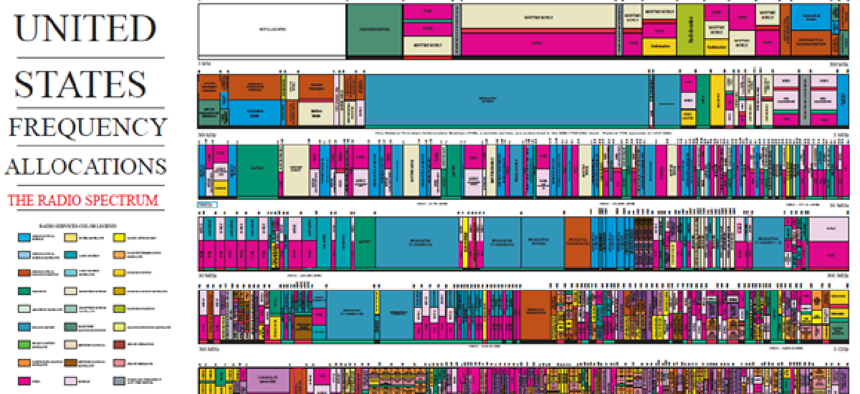Connecting state and local government leaders
It’s all about spectrum allocation, and devices with access to the 60 GHz band, 802.11ac devices would have enough to transmit uncompressed video, for example.
Lately we’ve been covering amendments to the Institute of Electrical and Electronics Engineers (IEEE) 802.11 wireless networking specification, which will improve speed and performance on the kind of wireless, mobile-device networks public-sector agencies are increasingly running.
Aside from the speed of the new WiFi 802.11ac devices, there’s also the matter of the radio-frequency real estate on which they’ll operate. We’ve been talking about how 802.11ac devices only operate in the 5-gigahertz (GHz) band, and how the Wireless Gigabit Alliance (WiGig) is looking at ways to use frequencies in the 60 GHz band.
But what does all of that mean?
Related coverage:
802.11ac WiFi could help agencies cope with BYOD
Well, first, let’s make sure we all know our elementary physics. The electromagnetic spectrum essentially is the range of all frequencies of electromagnetic radiation, which is a type of energy in wave form. This runs the gamut from long radio waves on the low-frequency end to Gamma rays on the high-frequency end.
The National Telecommunications and Information Administration’s Office of Spectrum Management is concerned only with the frequencies on the low-frequency end – the short, medium and long radio waves. They have made this easy-to-understand chart. http://www.ntia.doc.gov/files/ntia/publications/spectrum_wall_chart_aug2011.pdf
Just kidding - it’s not easy to decipher at all. The NTIA office has accumulated all of the frequencies regulated, licensed, specified and used by the various government agencies and put all of that into one chart. No wonder they don’t put these out every year – it probably takes them a long time to accumulate the data. But this definitely gives you an idea of how crowded the spectrum actually is.
For our purposes, we will only be referring to some of the light purple areas tagged “Mobile,” and occasionally the dark cyan areas marked “Land Mobile.” These types of service cover both cellular phone use and wireless networking, among other things.
Most cellular frequencies are in the 698-894-megahertz (MHz) neighborhood, nestled in between UHF broadcasting and some aeronautical radio navigation frequencies. Another large band is from 2.496 GHz to 2.69 GHz. There are a few other narrow strips that are also regulated by the Federal Communications Commission for cell phone use, but the majority of them are in these two areas.
The “2.4 GHz band” used by 802.11b, g and n devices is broken up into 11 channels in the United States (the rest of the world uses a few more at higher frequencies). The center of each channel is spaced out every five megahertz, starting from channel 1 at 2.412 GHz on up to channel 11 centered on 2.462 GHz. Since the bandwidth, or range of frequency, assigned to each channel is 22 MHz for b, 20 MHz for g and up to 40 MHz for n, obviously adjacent channels have a lot of overlap and can interfere with each other. This is why manufacturers recommend you only use channels 1, 6 and 11 most of the time.
The “5 GHz band” used by 802.11a, n and now ac devices works very similarly to the 2.4 GHz band, just at a higher frequency. The channels are spaced out every 20 MHz from 5.18 GHz to 5.70 GHz. Of course, 802.11n uses 40-MHz channels and ac’s channels are up to 160-MHz wide, so there is a similar overlap problem.
Still with me? Good, because now I will show how the efforts of WiGig may affect the face of wireless networking. They are currently defining how devices can use the 60 GHz band, which is as yet unused by mobile devices.
WiGig is actually referring to the range of frequencies from 57.24 to 63.72 GHz. This is a bigger chunk of the electromagnetic spectrum than all of it up to and including the 5-GHz band. Suffice to say it is roomy. They say that each channel will be 2.16 GHz wide, which is 54 times as big as the 40-MHz channels of 802.11n. They don’t say how many channels the new specification will have, but it’s clear there isn’t room for more than three without overlap. So we’ll probably have a setup similar to the other bands – several available channels but only three recommended for use.
WiGig says that this drastically increased bandwidth will be able to support applications that require extremely fast communication, such as uncompressed video transmission. That kind of capability conceivably could come in handy in emergencies, for instance, or for the wireless transmission of large data sets. Of course, the higher the frequency, the greater the propagation loss over distance, but we’ll cover how WiGig proposes to overcome that obstacle at another time.
NEXT STORY: Labor portal eases fed workers' comp filings



